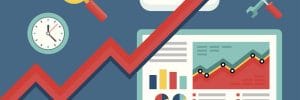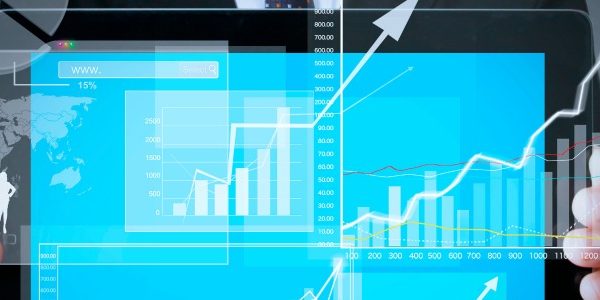Dashboards are a type of business intelligence tool that allows a business to monitor and track their key performance indicators (KPIs). KPIs on the dashboard are particularly useful in making informed decisions and strategies. Below are a few different examples of dashboards in real-life business situations.
Marketing insights
There is a significant amount of data that comes in from a variety of different channels. Your marketing department can use this information to construct valuable dashboards that will help in making informed decisions. Marketing specialists can use dashboards to predict monthly sales, analyze trends, or build strategies based off of the KPIs. These dashboards allow the team to sort, compare, and analyze the raw data in a way that produces valuable information, presented in a simple manner. Using dashboards will allow your team to construct better marketing campaigns.
Tracking sales opportunities
Your team can use sales dashboards to track the different products and services your organization sells. This will help you to identify new sales opportunities by tracking the performance of top-selling products and comparing the revenue growth on a regular basis. Sales dashboards are constantly syncing the new information, so you never have to worry about your charts not being up to date. This gets rid of the need to manually enter new data and prepare sales charts and reports.
Social media management
There is a lot more to social media management than just frequently posting to your different accounts. Most times, the dashboard used through your social media platforms does not give you enough information to make valuable insights and decisions. There is a lot more valuable information stored in dashboards that the social media manager could use to make predictions, analyze trends, and better connect with your audience.
We know that managing multiple social media accounts can be quite difficult, since you are posting different content all over different accounts. Instead, you can manage all your accounts through a comprehensive social media dashboard. Some of these dashboards allow to monitor audience demographics, popular posting times, engagement, and many other important KPIs, saving you time and money.
Financial reports
Collecting and analyzing financial information can be a complex task that if not done correctly, can often lead to misinterpretation of important information. Dashboards easily allow the creation of financial reports, and financial analysts can take advantage of this to construct useful visual of the sensitive data. Whether is is customer invoices, monitoring expenses, or tracking your revenue goals, financial dashboards allow for easy interpretation to construct accurate visuals.
Project collaboration
The majority of businesses require their employees to collaborate on projects, whether it is in person or online. Project managers must get their team organized to give them project deadlines, duties, standards, and to get progress updates. Using collaboration dashboards, team members will see the projects complete workflow, allowing for a smoother and collaborative working environment.
Dashboards allow for efficient and quick presentations of complex business data that will make your team more productive. If you are interested in using dashboards and other cutting-edge tools to make your job easier, contact our consultants today. by clicking Here.









